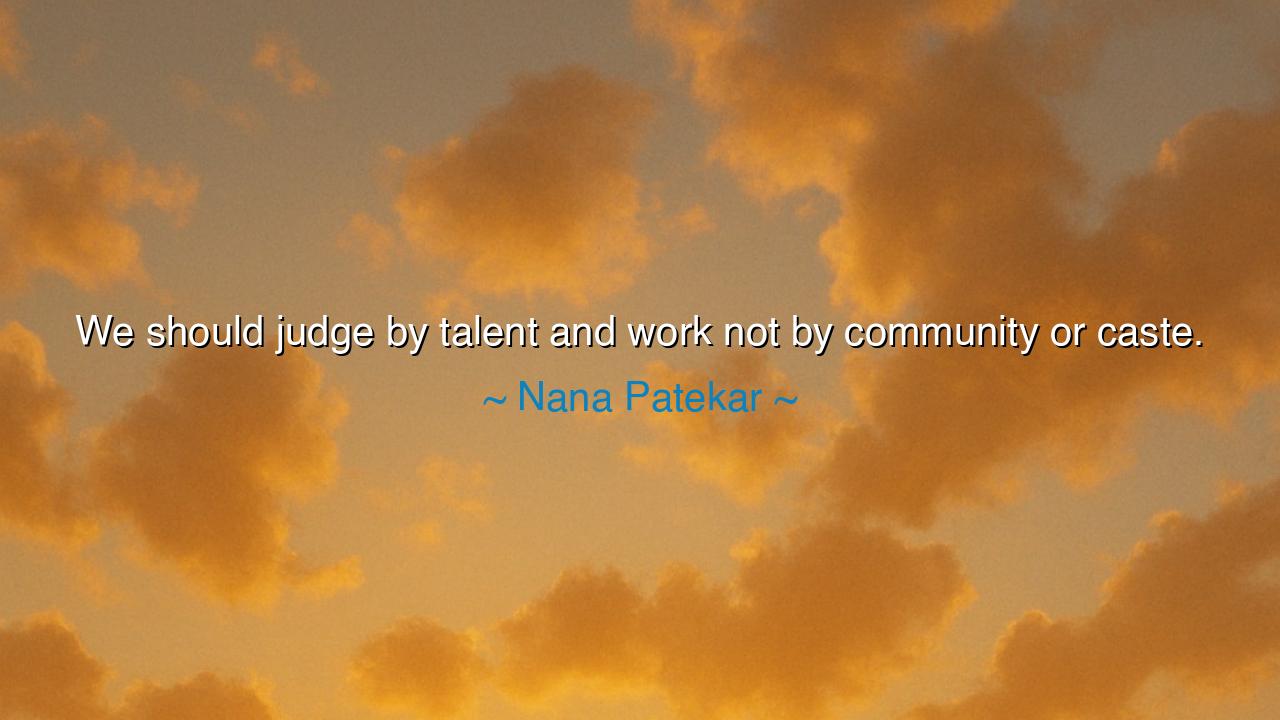
We should judge by talent and work not by community or caste.






The venerable Nana Patekar speaks with the voice of justice and equality when he declares: “We should judge by talent and work, not by community or caste.” These words pierce through the layers of prejudice that have divided societies for centuries, calling upon humanity to see the true worth of a person not through the accidents of birth, but through the virtues of effort and ability. It is a reminder that greatness is not inherited, but forged by one’s own hands and spirit.
Talent is a divine gift, a spark placed within each soul by destiny or the heavens. It knows no boundaries of caste or community, for it flows freely across all people, waiting to be discovered and nurtured. When a society chooses to honor talent, it rises to greatness, for it places its trust in skill, creativity, and vision rather than blind tradition. By doing so, it unlocks the hidden potential of every individual, turning division into unity.
Work, too, is sacred. It reflects discipline, perseverance, and the strength of character. To judge a person by their work is to honor their choices and sacrifices, to see the story they have written through sweat and toil. Unlike community or caste, which are given by birth and cannot be changed, work is the measure of what a person becomes through will and determination. In this way, it is the truest and fairest standard of worth.
The evils of judging by caste are ancient, rooted in systems that sought to control and divide. Such divisions weaken societies, for they place false barriers between those who could otherwise stand together. Patekar’s words arise from a vision of renewal, echoing reformers and sages who, throughout history, have fought to replace injustice with equality. His call is not only for fairness but for liberation—from the chains of ignorance and inherited bias.
Thus, let this wisdom endure: let no one be praised or condemned for the house into which they were born. Instead, look to their talent and their work, for these are the true mirrors of the soul. A society that lives by this principle will rise like a mighty tree, its roots nourished by justice and its branches spreading harmony to all who dwell beneath its shade.






HNTran Ho Nam
I admire Nana Patekar’s advocacy for judging people based on their work and talent, not community or caste. It’s an ideal many strive for, but is it realistic in a world where identity is often tied to one’s background? How can we create a system that truly values individuals for their skills, rather than the circumstances of their birth? Is it possible to achieve this in today’s complex social landscape?
HNThi Ha Nguyen
Nana Patekar’s quote makes a strong statement about moving beyond caste and community when evaluating others. While the idea is noble, it makes me think about how we measure talent. What criteria do we use to judge someone’s work, and do those criteria truly allow for an unbiased evaluation? How do we challenge our own preconceptions and make sure we’re not unintentionally reinforcing the very biases Patekar warns against?
NNNgoc Nguyen
Nana Patekar’s call to judge talent by merit rather than caste or community is so important, especially in a world that’s still grappling with discrimination. But how do we create systems and spaces where people from marginalized communities can truly shine without being held back by societal structures? Can we make sure that opportunities are truly equal for everyone, or does the legacy of caste still impact how we perceive talent?
MNXuan Mai Nguyen
I agree with Nana Patekar’s perspective on judging people based on talent and work, rather than community or caste. But how do we dismantle the deeply ingrained biases that influence how we perceive others, even when we consciously try to avoid them? Can we truly judge talent objectively, or are we always influenced by external factors such as societal norms and expectations?
DVquan do van
Nana Patekar’s quote challenges us to look beyond community or caste when judging talent. It’s a call for fairness and meritocracy. However, in a world where social structures and biases are deeply rooted, how do we truly ensure that judgment is based on talent alone? Can we ever completely separate personal background from how we evaluate someone's capabilities, especially in a society where historical inequalities persist?